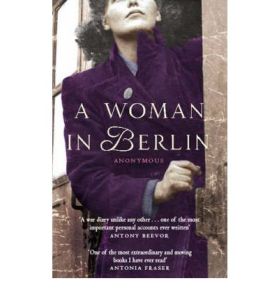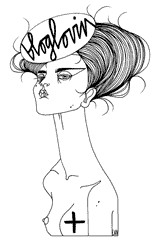A Woman in Berlin by Anonymous
30 November, 2011
After I read Millions Like Us by Virginia Nicholson, I knew I had to read A Woman by Berlin which she discussed in a talk I attended. And by chance, I came across a copy in my local charity shop and snapped it up. I found reading about the rapes by Russian soldiers after the fall of Berlin very disturbing, partly because it was something I knew nothing about even though I’ve read my fair share of history books. It really hits home how things, usually that to do with violence against women, are systematically brushed under the carpet and not spoken of. It’s a disgusting and disappointing habit.
A Woman in Berlin chronicles life in Berlin from April 24th to June 22nd 1946 just as Berlin fell to the Red Army. The narrator is a female journalist, well read, well traveled, alone who tries, together with the remaining people in her block of flats, to get through the terrifying days as the war draws to a close and the encroaching dangers of the Russian army.
What really surprised me about this account was how matter of fact the narrator is in her rendition of these fraught days. Not only is she discussing her own experiences but she is a witness to the experiences of everyone around her. They are her neighbours, colleagues, not necessarily friends. Yet what they all experience is collective trauma, and this makes them strong. Because of this, they are able to talk about the terrible things that have happened to them. She notes down how conversation has broken down, how propriety is no longer observed, how the women greet each other with the questions, ‘How many times were you raped?‘ I cannot think of anything more shocking. And what is most disturbing is that she is aware how in times of peace, a rape would tear a community apart, bring down swift justice and scar the women. But in times of war, where every woman has experienced rape, there is no other choice but to get on with it. Of course, many did not get over it and some even committed suicide so as not to get raped, but the sad thing is that many women had to go through such trauma, get on with their lives and later have to deal with the inability of their men to deal with it. And this naturally leads to a change in how they viewed their men.
I think the thing that is so impressive about this book is that it is written so well, and deals with such a traumatic subject with a light and manageable touch that when you do take pause to think about all that she has discussed, it hits you doubly hard. I don’t think I’ve read an account of rapes quite like this one. It’s unsentimental, matter of fact, the narrator is someone you can’t help but admire, someone with verve, vitality and a will to carry on but one who doesn’t let herself feel sorry for herself.
Of course, I’m aware this has been edited to allow for flow, but it’s an admirable piece of written history that really needs to be read more widely. And by that, I do not mean just by women.
There is also a film adaptation of this book, The Downfall of Berlin – Anonyma, which I’m hoping to watch soon.
Although this isn’t strictly literature, I read this as part of Caroline and Lizzys German Literature Month.












30 November, 2011 at 2:30 pm
What an interesting sounding book. I think it’s one I would like to read (I nearly said enjoy but that it probably not the right word). I read The Rape of Nanking some years ago about a similar thing in China and while the subject matter was horrifying, the book itself was important and a huge shock.
I do like reading real life history, especially if it is done in an accessible way and not dry or preachy.
6 December, 2011 at 10:21 pm
I agree that it has more impact if it isn’t preachy. I’ve been meaning to read The Rape of Nanking even though I know it’s going to upset me. But I feel it’s important to know about what happened however horrific, especially since many just want to brush it under the carpet.
30 November, 2011 at 2:58 pm
I think this is an amazing book. After I read it for the first time, I went out, bought half and dozen copies, and gave them away to friends, that’s how strongly I feel that people should read it. Even though I’d read and heard about how the Russians behaved when they arrived in Germany and German-occupied countries, both from family members who had been there and from history books, I still found myself devastated by her descriptions of rape. It is a fascinating and important book that, as you say, needs to be read more widely.
6 December, 2011 at 10:22 pm
Exactly. I’d never heard of this book before so I’m really glad I came across it and will be recommending it to a lot of people too.
30 November, 2011 at 3:35 pm
This book sounds incredibly interesting but I would really have to make sure I was prepared to read it because of the subject matter. Might be hard to manage.
6 December, 2011 at 10:23 pm
I thought it would be difficult to read too but it isn’t. It’s extremely well written so I hope you do give it a go.
30 November, 2011 at 4:53 pm
I have seen the movie not long ago and it is very well done.
It’s awful that in Germany people think it’s not OK to ask for sympathy for the victims because of what Germany did. How terrible to think you are not even allowed to complain about what happened to you.
This was part of the payback. While the RAF and others carpet bombed the cities, the Russians systematically raped the women.
In the Eastern parts of Germany, they were scared to death that the Russians would arrive before the Americans…
I think the woman who wrote it was a journalist that’s why the writing is quite good.
It’s so upsetting but I’m glad you reviewed it.
6 December, 2011 at 10:26 pm
Me too. I think there is nothing good about war. What’s left are victims on both sides and I feel it’s something we all have to keep in mind. It’s usually the women who have to keep quiet. I’ve got the DVD so will hopefully watch it soon (although I need to prepare myself). I’m glad to hear that you’ve seen the film and that it’s well made.
30 November, 2011 at 9:05 pm
I absolutely need to read this! Millions Like Us certainly made me want to, and your review even more so.
6 December, 2011 at 10:26 pm
I hope you do Ana and I’ll be looking forward to your thoughts as always!
1 December, 2011 at 2:00 am
How much we don’t know is systematically brought to my mind when I read. I thought I knew a fair amount but my knowledge seems negligible to what I really am not aware of.
6 December, 2011 at 10:27 pm
Same. There’s always lots that I realise I know nothing about even though I try to be well read!
1 December, 2011 at 11:08 am
I also watched the film a few months ago and it was very impressive and disturbing – even though I think that even the film doesn’t show how horrible that really must have been. I don’t know whether the book does.
6 December, 2011 at 10:28 pm
In some ways I think the book does tone down how horrific things were, even though you can’t really hide it, so you do come away angry and disturbed. So I’m sure both the film and the book are softer version of the reality.
4 December, 2011 at 7:57 pm
oh this does sound good ,although I wouldn’t had look at it mainly due to cover lol ,like books set in berlin ,all the best stu
6 December, 2011 at 10:29 pm
No, I agree with you that the cover doesn’t give the image you would expect from the book. Strange that.
5 December, 2011 at 10:43 am
It’s always good to have books which poke into areas many people would rather forget. In the Böll read-along, Caroline mentioned that there were very few writers who actually portrayed the true state of affairs In Germany at the end of the war. This sounds like one that is definitely worth reading.
6 December, 2011 at 10:31 pm
I really should get to Böll as well;P But yes, like with Japan, I think there are areas which are still not really discussed in both countries because of the reverberations of the war and maybe it’s time that it is.
7 December, 2011 at 1:19 pm
I’ve listened to German women’s oral histories about their experiences in the war. Rape was systematic, and according to the women, not only committed by the Russian troops. Wherever there is war, women are raped.
8 December, 2011 at 10:53 am
That must have been a difficult thing to listen to. And I’m sure we all now know that it happens everywhere. It just makes me so angry that rape is considered an unfortunate consequence of war when it will affect the women for the rest of their lives.
7 December, 2011 at 1:31 pm
A bit late to the party, but I read and reviewed this last year. In fact, I was going to chose it for book group but decided to read the first chapter to make sure it was okay and then before I knew it I’d read the whole damn book and I decided I should chose something I hadn’t read instead! It’s certainly a disturbing read and one that makes you feel grateful for small mercies. The woman’s strength was amazing, wasn’t it, and I did so admire her bravery. But what I really liked was her sense of humour and her spirit for survival. Quite inspiring.
8 December, 2011 at 10:55 am
It is very inspiring. I know what you mean about how easy it was to read this book and I think it would have made a very interesting book group discussion as it doesn’t seem like a well known title.
8 December, 2011 at 3:49 am
Thanks for your insightful review. This book certainly sounds intense and poignant… and I just can’t imagine what the movie will be like, horror and heartbreaks. But what’s so surprising is that there’s humour underlying the narratives, and that the book is actually uplifting and inspiring, according to some of your commenters.
8 December, 2011 at 10:56 am
I think humour is an effective way of dealing with trauma without taking away the gravity of the situation, so yes, I think the book was put together really well (although it is in diary form). But I hope you do get a chance to read this too.